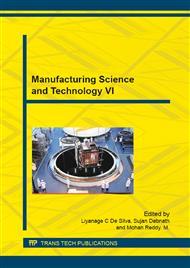[1]
H. N. Koivo, Book review: Practical PID control-Antonio Visioli, IEEE Transactions on Automatic Control, vol. 53, pp.2217-2218, (2008).
DOI: 10.1109/tac.2008.920854
Google Scholar
[2]
M. Sam Fadali, Ditital Control Engineering: Analysis and design, Acadamic Press, (2009).
Google Scholar
[3]
J. G. Zigeler, Nichols N B. optimization setting for automatic controller, Trans. ASME, Vol. 64, No. 11, pp.756-769, (1942).
Google Scholar
[4]
G. H. Cohen and G. A. Coon, Theoretical Consideration of Retarded Control, Trans. ASME, vol. 75, pp.827-834, (1953).
DOI: 10.1115/1.4015452
Google Scholar
[5]
H. Han, and A. Luo, Nonlinear PID controller based on genetic tuning algorithm, Control and Decision, Vol. 20, No. 4, pp.448-450, (2005).
Google Scholar
[6]
J. S. Yang, PID control for a binary distillation column using a genetic searching algorithm, WSEAS Trans. Systems, Vol. 5, No. 4, p.720726, (2006).
Google Scholar
[7]
T. H. Kim, Maruta, and T. Sugie, Robust PID controller tuning based on the constrained particle swarm optimization, Automatica, vol. 44, Issue 4, pp.1104-1110, April (2008).
DOI: 10.1016/j.automatica.2007.08.017
Google Scholar
[8]
Y. Luo, J. Zhang, and X. Li, The optimization of PID controller parameters based on artificial fish swarm algorithm, in: proc. the IEEE International Conf. Automation and Logistics, Jinan, China, pp.1058-1062, August (2007).
DOI: 10.1109/ical.2007.4338724
Google Scholar
[9]
D. B. Fogel, Evolutionary computation: toward a new philosophy of a machine intelligence, IEEE Press, New York, (2000).
Google Scholar
[10]
A. Jalilvand, A. Kimiyahgahalam, A. Ashouri, M. Mahadavi, Advanced Particle Swarm Optimization-Based PID Controller Parameters Tuning, 12th IEEE International Multitopic Conference, Karachi , pp.429-435, Dec. (2008).
DOI: 10.1109/inmic.2008.4777776
Google Scholar
[11]
J. Kennedy, R. C. Eberhart, Particle Swarm Optimisation, Proceedings of IEEE International Conference on Neural Networks, Perth, Australia, pp.1942-1948. (1995).
Google Scholar
[12]
X. Hu, Y. Shi, R. Eberhart, Recent Advances in Particle Swarm, Congress on Evolutionary Computation, pp.90-97. Piscataway, IEEE Service Center, (2004).
DOI: 10.1109/cec.2004.1330842
Google Scholar
[13]
C. M Huang, C. J. Huang, M. L. Wang, A Particle Swarm Optimisation to Identifying the ARMAX Model for Short term Load Forecasting, IEEE Transactions on Power Systems. 20, pp.1126-1133, (2005).
DOI: 10.1109/tpwrs.2005.846106
Google Scholar
[14]
M. Clerc, Particle Swarm Optimisation. ISTE Publishing Company, (2006).
Google Scholar
[15]
N. Nedjah, L. D. M. Mourelle, Systems Engineering Using Particle Swarm Optimisation, Nova Science Publishers, (2007).
Google Scholar


